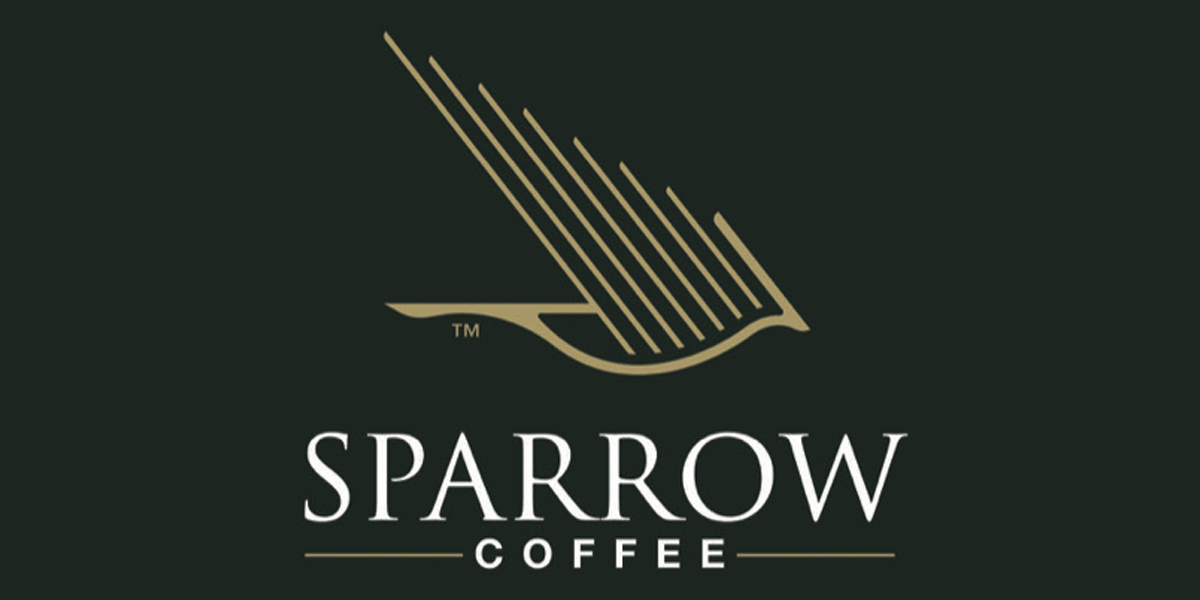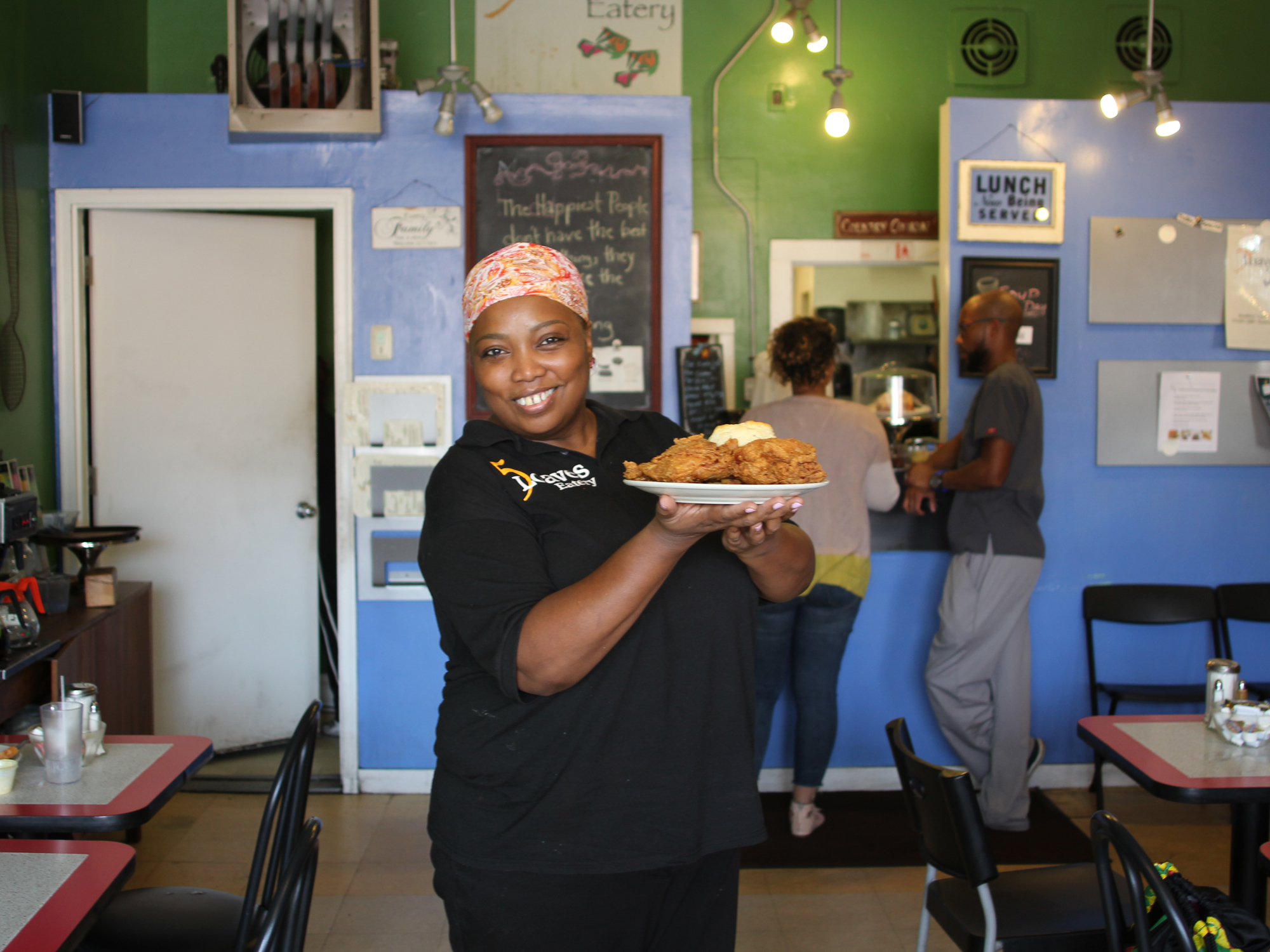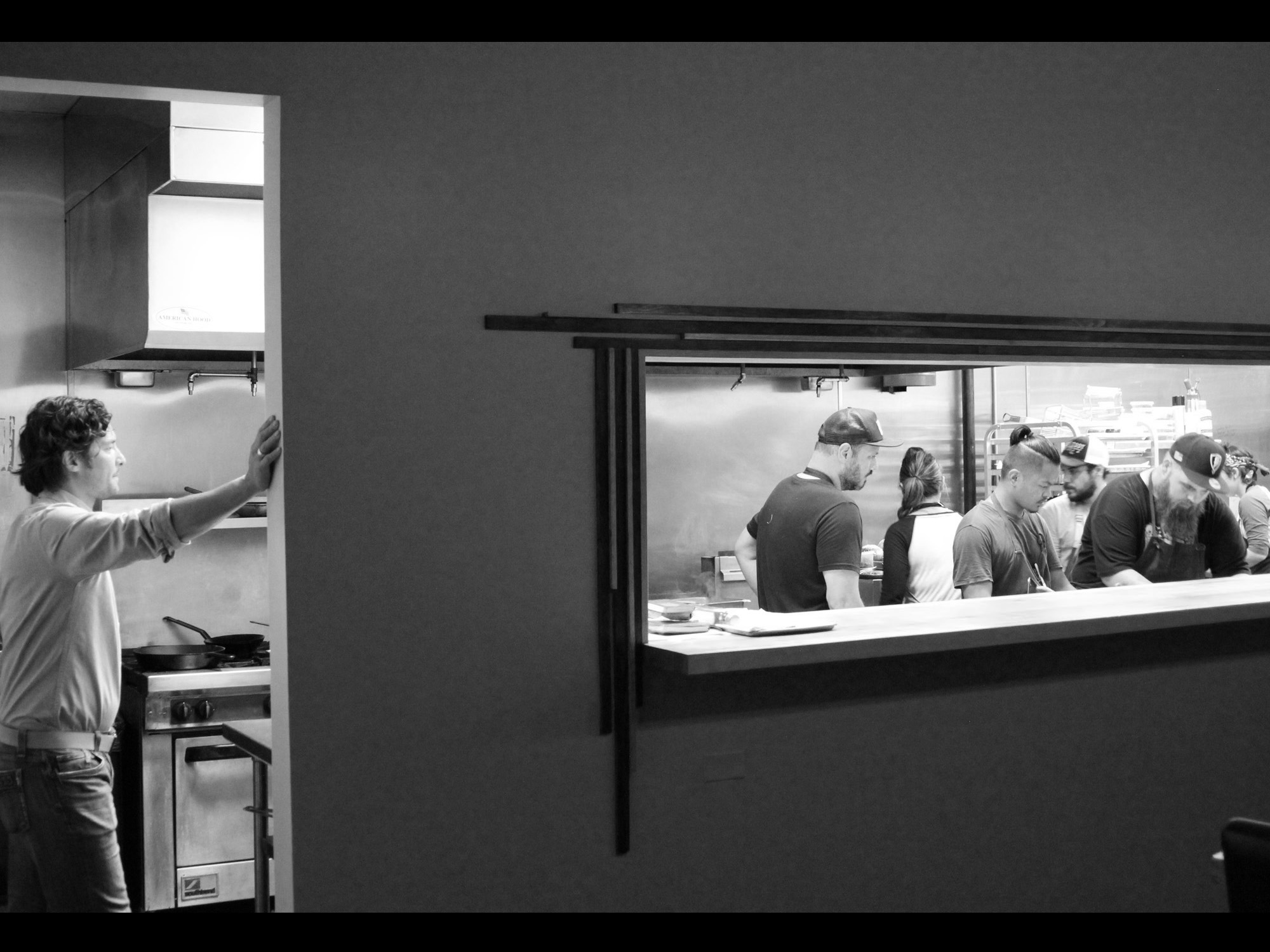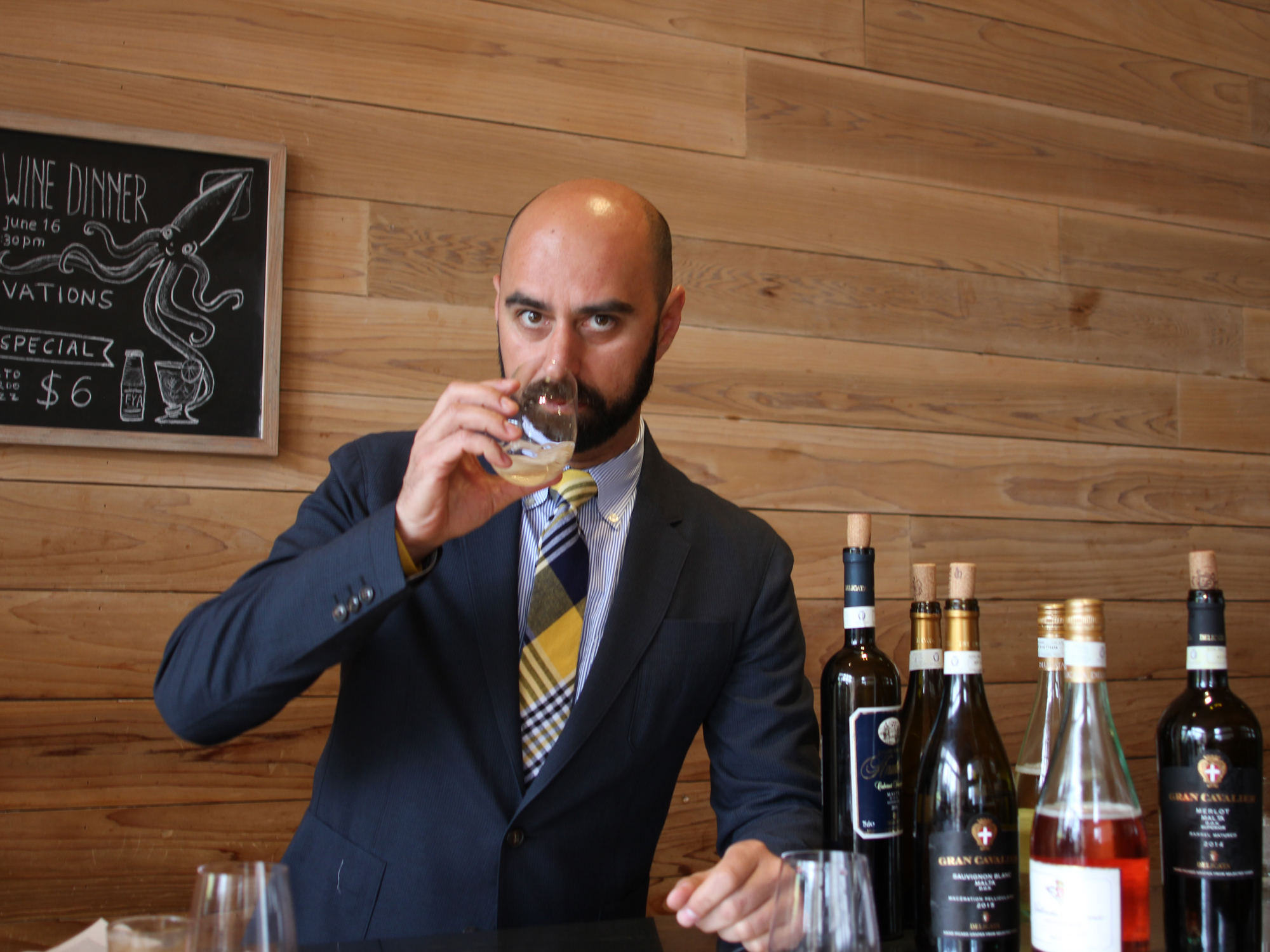COLLIN MOODY PICKS UP A SAMPLE OF WOODEN molding or trim from where it’s sitting on the bar—or, rather, the metal framework of what will be the bar at Income Tax when it opens (hopefully, like all openings) in December. “It looks like the edge of a Chicago bar. That’s literally what it’s called in the catalog—’Chicago bar,'” he says.
Most places these days aim to stand out. Income Tax, instead, aims to blend in—to become part of the fabric of the neighborhood for which it will be the first wine bar and semi-upscale cocktail lounge, as well as certainly the first restaurant to boast a chef with experience at Momofuku and with Wylie Dufresne. Okay, again, not exactly boast—even the name was chosen because, besides being a somewhat obscure vintage cocktail, it will make for the kind of nondescript signage that, owner Nelson Fitch says, is exactly what you see all over the neighborhood. It may seem a little odd to aim for generic, many places achieve it unwittingly, but the goal is to comfortably extend the neighborhood into good food and wine, not to stand out in it like an exotic flower (or a bright pink apartment building).
Income Tax will be two doors over from Edgewater’s best-known wine shop, Independent Spirits, and in fact it’s an outgrowth of that shop’s success in the neighborhood—not just because it showed that there could be a market in Edgewater for a wine-oriented business, but because Fitch and Moody (the general manager) met while working there. Moody, who got into wine from an earlier career working with coffee at Intelligentsia, then worked at other wine shops around town to expand his knowledge. On his last day at Perman Wine Selections he met a chef at Maple & Ash who had worked in New York and had been taking Belinda Chang’s weekly wine courses for staff there. They talked, and then they had lunch and kept talking about wine and food, and before long Ryan Henderson was on board as the chef for Income Tax.
As workmen speaking in Polish made progress on the 50 seat space divided into bar and restaurant, Moody opened a bottle of German Riesling and we talked about where the idea for Income Tax and a wine bar in this neighborhood came from.
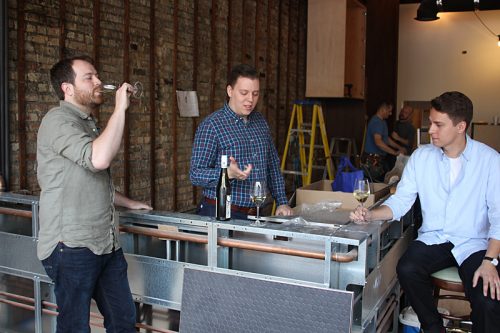
Chef Ryan Henderson, manager Collin Moody, and owner Nelson Fitch
FOODITOR: How did this get started?
FITCH: A few years ago my wife and I lived in Edgewater, just down the street from where Income Tax is opening. We really loved the neighborhood, and when Independent Spirits opened up I started working there. I fell in love with wine and spirits and all kinds of stuff. And I realized there was an amazing customer base of people drinking really exciting things, and excited about food and beverage generally.
But the neighborhood was lacking a little in the high quality beverage department. The space opened up, and I was ready to do my own thing.
You’re on Edgewater’s one little higher end food and beverage strip, with Independent Spirits and Indie Cafe. Is there any other sort of wine or cocktail place in the area?
Andersonville of course has a couple of cocktail bars, and more wine-oriented places like Pastoral. There’s a few places up and down Broadway, old divey bars, and up on Granville some cocktail bars that are more [Loyola] student-focused.
In terms of food, Indie Cafe’s done really well, they’ve been around for a while now. They’re wonderful people and it’s nice to know this strip has traffic and people eating.
MOODY: And Andersonville as well, being so close. There’s so much traffic over there and Edgewater’s such an incredibly dense neighborhood, we just really felt that there was a huge opportunity here to serve a group of people here who don’t have a ton of options for dining out right now.
Tell me how you arrived at what kind of bar you wanted it to be.
FITCH: The point has always been to be focused on wine. Seeing how customers interact with it at Independent Spirits was very exciting, knowing that there’s an amazing market here but it’s not always people’s first choice in restaurants to open bottles. So being able to present a really great bottle list was always a priority, but at the same time, being a neighborhood place was important to us.
MOODY: We have a small list, about 80 bottles, and a small by the glass list. But we wanted to give people the opportunity to open anything on the list by buying half the bottle. If you come in with your partner and want to open a glass of bubbles with your appetizers, and then have a glass of red with your entree, you can essentially get two half bottles on the list. And then the rest of that bottle, we’ll have available to the rest of the restaurant, as by the glass. So it gives us this really dynamic by the glass list, while at the same time you don’t have to commit to a whole bottle of wine. Which on a Tuesday…
It gives a communal spirit to the bar, in a way, because you buy this half a bottle and the guys at the bar now have a chance to taste something really special.
FITCH: So wine, and then cocktails, mostly involving classics, were an easy choice. And a lot of it is around things that we love, stuff that’s a little more eccentric, but we think has a great place at the table.
MOODY: On the spirits side, we’re working with a lot of grape-based spirits, Calvados, brandies, eau-de-vies, things like that. Just doing a lot with that fruit base which has such a clear tie-in on the wine side. And then another category that we’re certainly excited about is sherry. Sherry is just this extremely special wine from coastal Spain that I think just has such potential on the table. You know, dry sherry like fino and manzanilla with little bites of seafood and everything else, there’s just nothing better in the world. That’s a huge category that we look forward to working with.
HENDERSON: And people in this area seem to buy them, right? Independent Spirits sells more sherry than anyone else—
MOODY: Just about anyone else in the city. It’s crazy.
Why is that, did he specialize in it?
It’s not even that he specialized in it. I think he just had staff members like Nelson that were willing to talk to people about it. We have a touch of naivety, I think, about the industry, but we have a desire to see categories that have sort of been ignored in the city get a little more face time. So sherry, eau-de-vies, brandy—with the way bourbon has been in this city, brandy represents an amazing value. Absinthe, even.
The other part of it is being part of the neighborhood, a real focus on hospitality and being kind to people. With that, wine is the focus, and doing that extremely well. Chicago is traditionally a beer and cocktail focused town. I think wine is starting to have its moment, so we want to do that well and at the same time, offer a pub for the neighborhood.
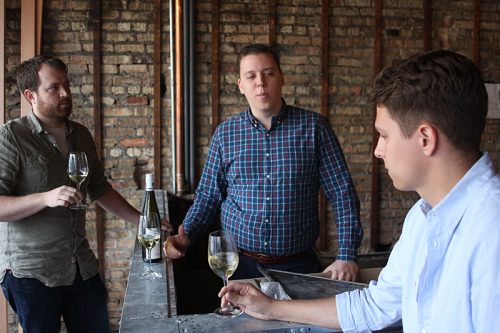
What was the process for getting the space? Did it have a tavern license?
FITCH: It did not. It had been, I think, a Somali restaurant—and a cell phone store, it was divided in half. There was a moratorium on the street I think between Elmdale to Ardmore or something, no tavern licenses. So there was a community process that I had to go through. It started with meeting the alderman and presenting the idea to him. He was on board, and also the Edgewater Development Corporation was extremely helpful in setting up meetings with community groups, block clubs, the Chamber of Commerce, stuff like that.
The wines that we love are made by farmers, vignerons. These are people with family farms that are working and tending these vines for a living. It has nothing to do with gentrification.
Scott [Crestodina] at Independent Spirits was extremely helpful in that process, because he had gone through it as well when he opened that shop. It was totally new to the neighborhood then, so his process was significantly longer than mine.
There were nine community meetings with smaller groups, and then one larger one, and it was a unanimous vote in favor at all of them.
Was food a requirement for getting the license?
FITCH: No. At the time we weren’t exactly sure what our food was going to look like and how much there was going to be, so our plans were much more drink-heavy and a tavern license was what we needed.
MOODY: It’s a much more difficult license to get—there’s more of a focus on you, and the moratoriums in the city almost always apply only to tavern licenses.
But after that whole process, we sort of came to a realization that the places that we loved were places where the marriage of food and wine was a special thing. We have this value that wine belongs at the table. Where the focus doesn’t have to be 100% on the beverage, but brightening the table and the community of food and wine.
If nothing else, that process was so incredibly encouraging with the community support. The alderman has been a big advocate for us, and being able to get in touch with the community groups and talk to them about what we’re doing, we couldn’t have asked for a better opportunity to begin the process off.
Did you run into any community resistance to gentrification, or being too fancy for the neighborhood, or anything like that?
MOODY: We really didn’t run into any of that. That’s something that we’ve been extremely sensitive to throughout the entire process—I mean, we haven’t talked about the name too much but Income Tax, it’s an old cocktail name but it also came from the idea of blending into the neighborhood storefronts on Broadway. There’s a lot of vacant storefronts in this area, or stores that are very generic and there’s a sign that just says “Mattress Store” or “Cleaners” or “Income Tax.” So Nelson’s original idea for the name came from the idea of blending into the neighborhood. The facade is only going to have a simple neon sign that says “Income Tax.”
And that’s consistent with the materials that we’re going to use in the bar—it’s a lot of dark wood, it’s not going to be the same things we’d use in the West Loop. Even that strip around the bar, that idea that it’s the Chicago trim around the bar—it’s a lot of old world materials, things that are very comfortable, very taverny. And Nelson is making some of the wood tables for the dining room himself. Not the marble ones in the bar, though.
FITCH: Hey guys, I just got back from the quarry…
MOODY: That’s even the thing with the mixology—wine is seen as this product that you have to all this knowledge and endless supplies of income to be able to afford. But the wines that we love are made by farmers, vignerons. Real farmers in the Loire valley of France, or nowhere, Southwest Germany. That Riesling that we opened today at the bar—these are people with family farms that are working and tending these vines for a living. And it just really has nothing to do with the idea of gentrification, or these high end, uppity, fine dining places. These are real products made by real people, from the land.
FITCH: It’s not a dogmatic list by any means, but we like producers who have that agricultural mindset and smaller farms. And that can come from little spots in the Loire valley but also classic regions like Burgundy and Piedmont. It certainly leans old world—France, Italy, Germany is the bulk of it. But it can be from anywhere.
MOODY: Value’s a really huge thing to us, so over half the list is under $55 a bottle, which I think is the point where, you’re thinking about getting 4 or 5 glasses out of a bottle, and you see the value of switching over from by the glass.
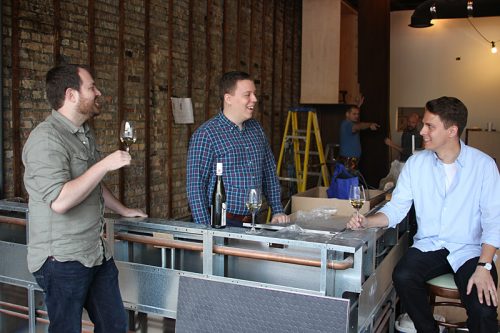
Let’s switch gears to food, and talk to your chef. So you’re making food to go with all this wine and stuff.
HENDERSON: Yeah! Because I was on the same team finding fun wines and learning all these new things, I decided to take inspiration from all the old, classic, what pairs well with wine—well, food of a place pairs well with wine of a place. So taking inspiration from that idea and going and looking at these classic dishes in these old world areas. Making food that’s comfortable, and homey, and highlights the wine. The food is wine friendly, but the wine is also food friendly.
So it’s going to be food coming from these regions, but in a little bit different way. So we’re not going to have, like, the strictest sense of a grandmother’s coq au vin, but a coq au vin will be on the menu because it’s delicious and it works with burgundy, and there’s a reason they’ve been eating that there forever.
So how would you characterize it—is it going to be mostly French and Italian?
We’re going to have a few different sections, very much like a wine list. The idea was, just as in wine where you travel around the world, let’s see if we can have food that travels a little bit. So there’ll be some French dishes, some Spanish dishes, some Italian dishes and some German dishes to start. So you can just get a plate of duck and be happy with your glass, or you can try a few plates and order a bottle, you can do that too. It’s really inclusive for the neighborhood, so people can walk in and try different things around the world—well, the old world, I guess.
Yeah, because you worked for Momofuku—
I was in New York for just under six years, and I worked at a couple of different restaurants there. I worked for David Chang at Momofuku for a little while, and I worked for Alex Stupak for the Empellon chain—
Which means, Asian and Mexican, and you’re not cooking either one here?
Um… no. I’m not. But there’s a lot of technique and beauty in those foods. At Momofuku what they do really well is that they push food. And they do it in a great way to make volume, but thoughtful volume, without just freeze-drying everything. And then, one thing Alex Stupak was amazing at was plating, and creating these works of art. And sometimes they took a little long, and you’re wondering where the hell my hot food is…
But having that palate, and seeing how he plated food is so beautiful. And then I got the chance to work for Wylie Dufresne after that. And I was the chef de cuisine at Alder before it closed. So then I got to see, how can you take twists on things. I don’t want to go so far as shouting about modernist, molecular gastronomy, but there’s a lot of really thoughtful things, one of Wylie’s things is, there’s not a right or a wrong way to cook food, there’s just a more informed way of cooking food. So we can take that knowledge, and use those techniques and ideas so that we can create these things such as coq au vin where it’s not going to be fully classic, but it’s going to have that same soul.
FITCH: We considered foaming everything on the menu—
HENDERSON: And we can spherify anything you like, if you want to come in.
How did you, Nelson and Collin, approach looking for a chef?
MOODY: I was working in wine retail, for the opportunities for tasting and working with distributors. In terms of talking about our chef, the wine piece was so key. And we just kept meeting and interviewing people who drank bourbon and PBR and all these things. I have a place in my life for a lot of those things but I was looking for a lot more balance, and people who understood where we were coming from.
I met this guy who told me he was working at Maple & Ash and he was buying some pretty exciting stuff. He let me talk his ear off for 15 minutes or so about some cool stuff that we had in the shop, and I figured there’s no harm in buying him lunch and picking his brain about what he was doing in Chicago.
We posted publicly a lot of places, and it’s funny that my last day working with Craig [Perman], we meet our chef.
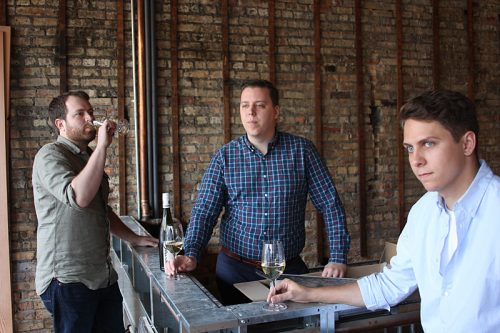
Michael Gebert is the auditor of Fooditor.
Latest
Join the Discussion
After you comment, click Post. If you're not already logged in you will be asked to log in or register with Disqus.




